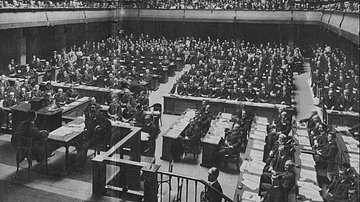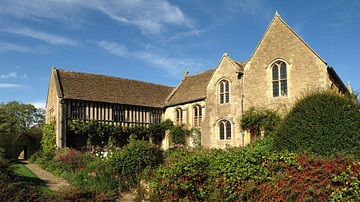Search
Search Results

Image
General Assembly, League of Nations
A 1923 photograph of the Assembly of the League of Nations in Geneva, Switzerland.

Image
Statue of General Hahibra
The shrine contains a figure of Osiris, the god of the dead. This statue stood in a temple at Sais, then capital of Egypt. The text on the back-pillar calls Wahibra an "overseer of access of foreign lands (who managed trade on Egypt's southern...

Definition
Honoré-Gabriel Riqueti, comte de Mirabeau
Honoré-Gabriel Riqueti, comte de Mirabeau (l. 1749-1791) was a French orator and nobleman who rose to prominence as a leader during the early stages of the French Revolution (1789-1799). From the disgraced and scandalized son of a distinguished...

Definition
Manorialism
Medieval European Manorialism (Manorial System) was the system where rural society was arranged around a manor house or castle on an estate. The smallest units of these estates were called manors. Free and unfree labourers here worked the...

Video
30th July 1619: Oldest Continuous General Assembly in the New World Convenes in Virginia
The Virginia Company of London established the Jamestown Colony as the first permanent English settlement in the Americas in 1607. After a difficult first decade the community’s fortunes began to improve and in 1619 the new Governor of Virginia...

Definition
Gilbert du Motier, Marquis de Lafayette
Marie-Joseph Paul Yves Roch Gilbert du Motier, Marquis de La Fayette (l. 1757-1834), more commonly known in the United States as simply Lafayette, was a French aristocrat, military officer, and politician. He was a major figure in both the...

Video
Roman Arches (General) - Ancient Rome Live (AIRC)
The arch is one of the most quintessential features of Roman architecture. It appears in aqueduct arcades, bridges, and many monumental structures like free-standing amphitheaters, stadiums, etc. Although the Romans didn’t create the arch...

Video
Roman Bridges (General) - Ancient Rome Live
The Romans employed the arch in the construction of their bridges to span the Tiber River, approximately 100 m wide. The actual arches were composed of voussoir blocks typically faced in ashlar blocks (tuff, travertine) with a concrete rubble...

Video
Amphitheatrum (Amphitheaters) General - Ancient Rome Live (AIRC)
This is a uniquely Roman structure whose definition, a theater with seating on all sides, borrows from the Greek terms “amphi” on all sides and theater, a Greek construction, specifically created viewing gladiatorial spectacles in the central...

Video
Basilicas (General) - Ancient Rome Live (AIRC)
The term comes from the Greek word “kingly hall” to describe the covered public hall or stoa that the Romans first built in the forum area in the 2nd Century BCE for conducting legal and business activities. The Basilica Porcia was first...